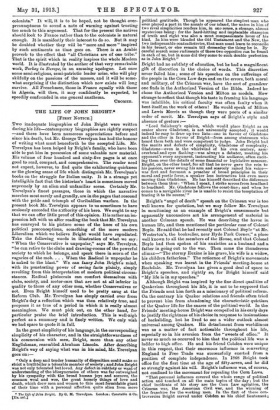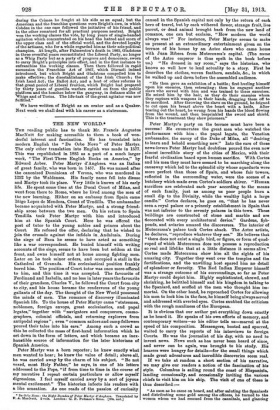Two inadequate biographies of John Bright were written during his
life—contemporary biographies are rightly suspect —and there have been numerous appreciations before and since his death, but Mr. George Trevelyan has had the honour of writing what must henceforth be the accepted Life. Mr.
Trevelyan has been helped by Bright's family, who have been able to put him in possession of some valuable new material. His volume of four hundred and sixty-five pages is at once good to read, compact, and comprehensive. The reader need not expect, however, to find quite the exhilarating quickness or the glowing sense of life which distinguish Mr. Trevelyan's books on the struggle for Italian unity. It is a strange yet intelligible fact that the historian's heart is sometimes moved supremely by an alien and unfamiliar scene. Certainly Mr. Trevelyan's finest passages, those in which the narrative marches most surely and grandly, are in the pages that resound with the pride and triumph of Garibaldian warfare. In the present book Mr. Trevelyan appears to us sometimes to have zealously exceeded the authority of his hero. We ought to say that we can offer little proof of this opinion. It is rather an im- pression left with us after reading the book that Mr. Trevelyan has conveyed to his picture some of the hues of his own political preconceptions, something of the more modern Liberalism which we believe Bright would have repudiated. Take the following words in illustration of what we say: " When the Conservative is unpopular," says Mr. Trevelyan, "be can retire to the clubs and drawing-rooms of the powerful society to which he belongs, and speak there in scorn of the vagaries of the mob. . . . When the Radical is unpopular he is naked to the blast." We can fancy John Bright's mind, with its penetrating power of seeing facts plainly, simply revolting from this interpretation of modern political circum- stances. Radical plutocrats can comfort themselves with clubs, society, and motor-cars that are not at all inferior in quality to those of any other men, whether Conservatives or not. Even Bright himself used to be pretty snug at the Reform Club. Mr. Trevelyan has simply carried over from Bright's day a reflection which was then relatively true, and proposes it as true of a period in which it is really almost meaningless. We must pick out, on the other hand, for particular praise the brief introduction. This is well-nigh perfect as a summary and is finely written. We only wish we had space to quote it in full.
In the great simplicity of his language, in the corresponding simplicity of his character, and in the straightforwardness of his communion with men, Bright, more than any other Englishman, resembled Abraham Lincoln. After describing Bright's way of saying what was in his mind, Mr. Trevelyan goes on r-
" Only a deep and tender humanity of disposition could make so strict a truthteller a tolerable member of society; and John Bright was not only tolerated but loved. Any defect in subtlety or want of understanding of the idiosyncrasies of others was far outweighed by his sympathy with the broad human joys and sorrows, the common weal and woe, the great homely things of love and death, which drew men and women to this most formidable giant of their time with a personal affection quite alien from mere • The Life of Jahn Bright. By G. X. Trevelyan. London: Constable & Co. Lila. net.] political gratitude. Though he appeared the simplest man who ever played a part in the annals of our island, the union in him of two rival simplicities renders him, in one sense, a strange, almost mysterious being : for the hard-hitting and implacable champion of truth and right was also a most compassionate lover of his kind. In him were blended the Old Testament and the New, the two indispensable contradictories, that man must learn to reconcile in his breast, or else remain till doomsday the thing he is. By careful search some rudiments of these two opposites can be found in each of us, but in none did they come to such double perfeetion as in John Bright."
Bright had no subtlety of education, but he had a magnificent gift of discretion in the choice of words. This discretion never failed him ; some of his speeches on the sufferings of the people in the Corn Law days and on the errors, both moral and military, of the Crimean war, have the sort of grandeur one finds in the Authorized Version of the Bible. Indeed he chose the Authorized Version and Milton as models. How strange to reflect that though his taste in framing his language was infallible, his critical faculty was often faulty when it bent itself on the work of others! He would speak of Milton and Lewis Morris as though they were poets of a similar order of merit. Mr. Trevelyan says of Bright's style and absence of gesture :-
"Lord Salisbury's opinion, which would place Bright as an orator above Gladstone, is not universally accepted ; it would indeed be easy to draw up two lists—one in favour of Gladstone and the other in favour of Bright—from among statesmen who heard them both and were competent to judge. John Bright had the merits and defects of simplicity, Gladstone of complexity. Gladstone—even in the whirlwind of his own oratory, arms overhead and eyes flashing—was always a debater, meeting his opponent's every argument, instructing his audience, often excit- ing them over the details of some financial or legislative measure. Bright, on the other hand, for all that he never gave the rein to his passion, never swung his arm and scarcely raised his voice— was first and foremost a preacher of broad principles in their moral and poetic force, a speaker less instructive but even more moving than Gladstone. He has himself described the difference between them thus : When I speak, I strike across from headland to headland. Mr. Gladstone follows the coast-line; and when he comes to a navigable river he is unable to resist the temptation of tracing it to its source.'"
Bright's "angel of death" speech on the Crimean war is too well known for quotation, but we may follow Mr. Trevelyan in mentioning as an example of Bright's consummate but apparently unconscious art his arrangement of material in another Crimean speech. He was describing the havoc in human life, and then mentioned the particular case of Colonel Boyle. He said that he had recently met Colonel Boyle "at Mr. -Westerton's, the bookseller, near Hyde Park Corner," a place well known to all the members of the House, and that Colonel Boyle had then spoken of his anxieties as a husband and a, father in going out to the war. Then came the thunderous climax—" The stormy Euxine is his grave, his wife is a widow, his children fatherless." The reticence of Bright's movements when speaking was learnt in the Friends' meeting-house at Rochdale. Mr. Trevelyan has given a good deal of space to Bright's speeches, and rightly so, for Bright himself said "My life is in my speeches."
Although Bright was inspired by the fine direct qualities of Quakerism throughout his life, it is not to be supposed that the Friends sent him forth as a missionary of political reform. On the contrary his Quaker relations and friends often tried to prevent him from abandoning the characteristic quietism of the Quaker life for the snares of the political world. In the Friends' meeting-house Bright was compelled in his early days to justify the rightness of his choice in response to insinuations of backslid; g, but he lived to see a wider outlook almost universal among Quakers. His detachment from worldliness was as a matter of fact noticeable throughout his life, especially so in his aversion from the "sweets of office." It never so much as occurred to him that the political life was a ladder to high office. He and his friend Cobden were unique in this respect, that their enormous influence in converting England to Free Trade was successfully exerted from a position of complete independence. In 1868 Bright took office for the first time at the age of fifty-seven, and he did so strongly against his will. Bright's influence was, of course,
not confined to the movement for repealing the Corn Laws.
"That personal influence covered the whole range of political action and touched on all the main topics of the day ; but the chief incidents of his story are the Corn Law agitation, the Crimean war, the American Civil war, and the winning of the franchise for the working men. In the first of these con- troversies Bright served under Cobden as his chief lieutenant ; during the Crimea he fought at his side as an equal; but the American and the franchise questions were Bright's own, in which Cobden in the one case followed the initiative of his friend, and in the other remained for all practical purposes neutral. Bright won the working classes the vote, by long years of single-handed agitation which concentrated on his head the hatred and scorn of the upper class and of the official world, and the devoted loyalty of the artisans, who for a while regarded him as their sole political champion. At length, after Palmerston's death in 1865, Gladstone in three eventful years reconstituted the Liberal Party, no longer as a Whig Party but as a party of progress and democracy, sworn to carry Bright's principles into effect, and in the first instance to enfranchise the working classes. Then there followed in rapid succession the Franchise Act of 1867, which Disraeli indeed introduced, but which Bright and Gladstone compelled him to make effective ; the disestablishment of the Irish Church ; the Irish Land Act; the Ballot Act; and a host of other reforms in that great period of Liberal fruition, which Bright had prepared by thirty years of guerilla warfare carried on from the public platform and the benches below the gangway, in defiance alike of Whigs and of Tories. The life-task of the great agitator was now fulfilled."
We have written of Bright as an orator and as a Quaker. Next week we shall deal with his career as a statesman.



















































 Previous page
Previous page